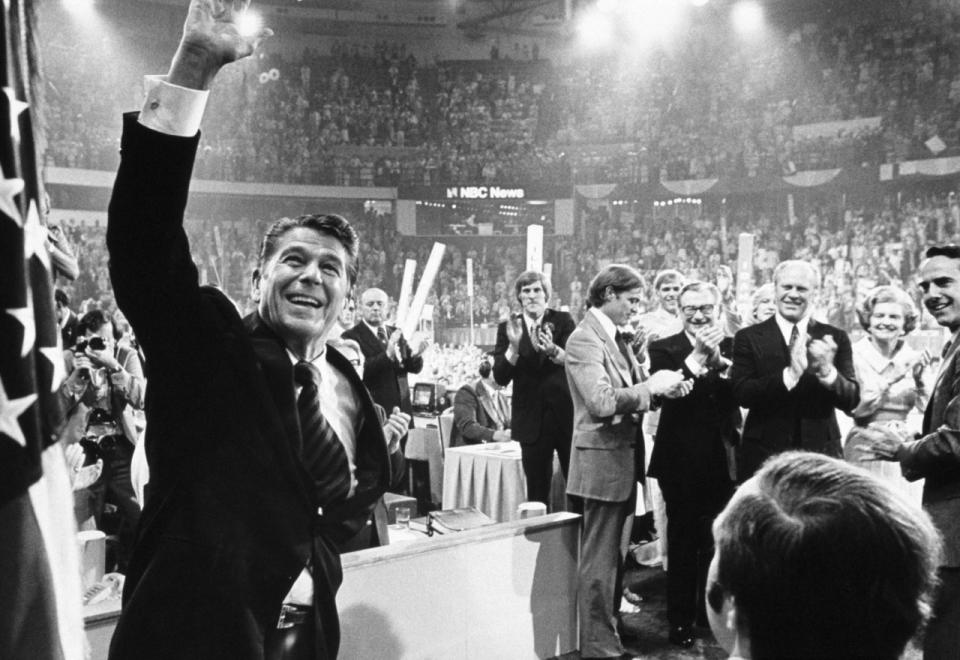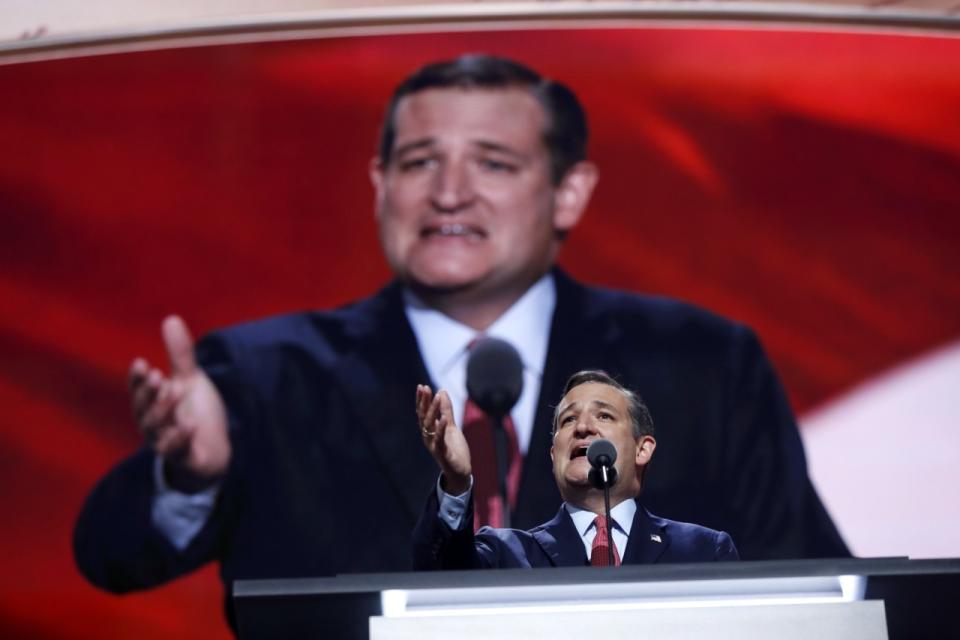Why Ted Cruz didn’t endorse Trump
In 1976, Ronald Reagan, who almost snatched the GOP nomination from incumbent Gerald Ford, was asked by Ford in the middle of the Republican convention to join him onstage and say a few words. Reagan warmly praised his rival for having treated him and his wife, Nancy, with grace and respect. But in his remarks, there was no endorsement. Reagan never explicitly said, “Vote for Gerald Ford.”
Instead, Reagan spoke of a time capsule, ruminating on what Americans 100 years in the future would say of Reagan’s generation. In the future, Reagan surmised, citizens would know whether the world had suffered a nuclear holocaust and whether the cause of individual freedom had been wiped off the planet.
“Whether [Americans] will have the freedom that we have known up until now will depend on what we do here,” he said. The delegates bathed Reagan in applause; significant discord didn’t erupt on the convention floor.
Last night, Ted Cruz also spoke of his conservative vision of freedom and defined what it meant to him to live in a free society. But he also sent a rude jolt through the Republican Party when he urged Americans “to vote their conscience.” What he didn’t do, before leaving the stage amid a chorus of boos and jeers,was offer an endorsement of the nominee, Donald Trump.

Cruz’s non-endorsement, though, shouldn’t have been terribly surprising to Trump and his fans. They should have seen it coming weeks ago. Cruz was speaking in a long, contentious tradition of conservatives bucking their party when they believe that their fundamental principles — limited government, unregulated markets, constitutional respect for restricting Washington’s power to run people’s lives — are being threatened. Cruz, rightly or wrongly, sees Trump as just such a threat to the conservative project.
Cruz had legitimate reasons for refusing to endorse the brash New York mogul. Undoubtedly, as Cruz said this morning, one was that Trump had crossed a line during the primary race, threatening to “spill the beans” on Cruz’s wife and smearing Cruz’s father with the absurd accusation that he was involved in the assassination of President John F. Kennedy.
It also seems safe to assume that political expediency drove Cruz’s non-endorsement. The Texas senator seems to be betting that Trump will lose to Hillary Clinton, and hewants to pick up the pieces for another presidential campaign in 2020.
But Cruz, who has a deserved reputation in the Senate as abomb-thrower prone to snubbing his party’s leadership, isn’t stupid. He is keenly aware that his conservative forebears, when faced with their own intraparty feuds and ideological rifts, often opted to define themselves as conservatives first and Republicans second. Mike Pence’s signature line — “I’m a Christian, a conservative and a Republican, in that order” — says so explicitly.

Cruz’s predecessors often put what they deemed ideological purity ahead of the imperatives of party unity and partisan loyalty. By prioritizing the conservative cause over the GOP’s short-term political interests, conservative Republicans have advanced the conservative movement in electoral politics, paving the way for bigger victories in the wake of stinging defeats.
Before Reagan spoke out for his conservative vision at the 1976 convention, Barry Goldwater flaunted his preference for ideological warfare over party unity. In the run-up to Goldwater’s 1964 convention address, the Republican convention in San Francisco’s Cow Palace was a discordant place. Keynoter Mark Hatfield, the Oregon governor, compared the John Birch Society’s anti-communist extremism to the communist movement itself and to the Ku Klux Klan. Goldwater’s defeated primary opponent, New York Gov. Nelson Rockefeller, mounted the platform as Goldwater’s delegates threw paper at him. Given only five minutes to make his remarks, Rockefeller tarred right-wing “extremists” for “breed[ing] hate, fear and terror.”
“They have no program for America — no program for the Republican party,” he said to boos and jeers. “They spread distrust. They engender suspicion. They encourage disunity.”
When Goldwater finally took the stage, he and his supporters were more focused on buoying the cause of conservatism than on ensuring party unity and even victory at the polls. Most famously, Goldwater defended his cause. “Extremism in the defense of liberty is no vice,” he said. And “moderation in the pursuit of justice is no virtue.” Equally famously, Goldwater lost in a landslide in November, but Reagan stepped in to pick up the pieces.
Conservative intellectual icon and founder of National Review William F. Buckley Jr. once described conservatives as “nonlicensed nonconformists.” While he supported some Republican candidates, his ultimate goal was to push conservatism into the political and intellectual mainstream, and rather than bow to calls for GOP unity, he denouncedmoderate Eisenhower Republicans as “politically, intellectually and morally repugnant.”
In Thursday night’s acceptance address, then, Trump’s challenge in some key respects isn’t even within his control. The likes of Cruz, anti-Trump leader Sen. Ben Sasse and conservative #NeverTrump voices such as columnist Jennifer Rubin all have concluded that Republican partisan considerations are significantly less important than defending what they see as their conservative principles and anti-big-government worldview from Trump-ism. For his part, Cruz has decided that he can survive the Trump uprising, prove to at least some conservatives that he faced down an apostate, and rebuild his party on Nov. 9.
History suggests he may have made a winning bet, and history will prove him right or wrong.
Matthew Dallek, an associate professor at George Washington University’s Graduate School of Political Management, is author of “Defenseless Under the Night: The Roosevelt Years and the Origins of Homeland Security.”
_____
Related slideshows:
On the ground at the Republican National Convention — a photo report >>>
‘Boos Cruz’: Newspapers react to Ted Cruz’s RNC stunner >>>
Front pages cover Donald Trump’s final primary victory >>>
Melania Trump in the convention spotlight >>>
Convention floor erupts when no roll call taken to change rules to unbind delegates >>>
How newspapers covered the RNC’s fiery first day >>>
Demonstrators protest outside the RNC >>>
(Cover tile photo: Brian Snyder/Reuters)


